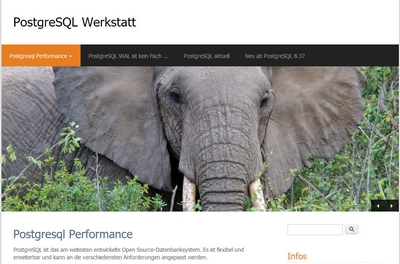Sammlung von Newsfeeds
Ahmet Gedemenli: pgstream v0.7.1: JSON transformers, progress tracking and wildcard support for snapshots
semab tariq: Which PostgreSQL HA Solution Fits Your Needs: Pgpool or Patroni?
When designing a highly available PostgreSQL cluster, two popular tools often come into the conversation: Pgpool-II and Patroni. Both are widely used in production environments, offer solid performance, and aim to improve resilience and reduce downtime; however, they take different approaches to achieving this goal.
Alexander Korotkov: The differences between OrioleDB and Neon
In a recent Hacker News discussion, there was some confusion about the differences between OrioleDB and Neon. Both look alike at first glance. Both promise a "next‑gen Postgres". Both have support for cloud‑native storage.
This post explains how the two projects differ in practice. And importantly, OrioleDB is more than an undo log for PostgreSQL.
Robert Haas: PostgreSQL Hacking + Patch Review Workshops for July 2025
Jan Wieremjewicz: PostgreSQL active-active replication, do you really need it?
Active-active, also referred to as multi-primary, is a setup where multiple database nodes can accept writes at the same time and propagate those changes to the others. In comparison, regular streaming replication in PostgreSQL allows only one node (the primary) to accept writes. All other nodes (replicas) are read-only and follow changes.
In an active-active setup:
Gabriele Bartolini: CNPG Recipe 19 – Finer Control Over Postgres Startup with Probes
CloudNativePG 1.26 introduces enhanced support for Kubernetes startup probes, giving users finer control over how and when PostgreSQL instances are marked as “started.” This article explores the new capabilities, including both basic and advanced configuration modes, and explains the different probe strategies—such as pg_isready, SQL query, and streaming for replicas. It provides practical guidance for improving the reliability of high-availability Postgres clusters by aligning startup conditions with actual database readiness.
Laurenz Albe: Preserve optimizer statistics during major upgrades with PostgreSQL v18
© Laurenz Albe 2025
Everybody wants good performance. When it comes to the execution of SQL statements, accurate optimizer statistics are key. With the upcoming v18 release, PostgreSQL will preserve the optimizer statistics during an upgrade with dump/restore or pg_upgrade (see commit 1fd1bd8710 and following). With the beta testing season for PostgreSQL v18 opened, it is time to get acquainted with the new feature.
Laurenz Albe: SELECT FOR UPDATE considered harmful in PostgreSQL
© Laurenz Albe 2025
Recently, while investigating a deadlock for a customer, I was again reminded how harmful SELECT FOR UPDATE can be for database concurrency. This is nothing new, but I find that many people don't know about the PostgreSQL row lock modes. So here I'll write up a detailed explanation to let you know when to avoid SELECT FOR UPDATE.
ahmed gouda: My PostgreSQL GSoC’25 Journey
- The Post will be Continuously Updated.
The first phase of GSoC is Community Bonding where mentee gets to know the community of his Organization.
Colin Copeland: Avoiding Timezone Traps: Correctly Extracting Date/Time Subfields in Django with PostgreSQL
Working with timezones can sometimes lead to confusing results, especially when combining Django's ORM, raw SQL for performance (like in PostgreSQL materialized views), and specific timezone requirements. I recently had an issue while aggregating traffic stop data by year, where all yearly calculations needed to reflect the 'America/New_York' (EST/EDT) timezone, even though our original data contained timestamp with time zone fields.
Andreas 'ads' Scherbaum: Nisha Moond
Ian Barwick: PgPedia Week, 2025-06-15
Stefanie Janine: Handling BLOBs In PostgreSQL Part 2
I have already published a blog post about PostgreSQL blobs.
But due to someone posting to get help about another implementation on the PostgreSQL Chat Telegram group about a very unusual method to store blobs, I thought, that should now also be covered.
I did not cover that method, because it is one of the worst ideas to handle blobs inside PostgreSQL.
Boriss Mejias: Contributions for the week of 2025-06-02 (Week 23)
PG Day France 2025 took place on June 3 and 4 in Mons, Belgium, organized by Leila Bakkali, Matt Cornillon, Stefan Fercot, Flavio Gurgel, Anthony Nowocien, and Julien Riou, with the help of Jean-Paul Argud
Radim Marek: First steps with Logical Replication in PostgreSQL
Most applications start with a single PostgreSQL database, but over time, the need to scale out, distribute the load, or integrate naturally arises. PostgreSQL's logical replication is one of the features that meets these demands by streaming row-level changes from one PostgreSQL instance to another, all using a publish-subscribe model. Logical replication is more than an advanced feature; it provides a flexible framework you can build on to further distribute and integrate PostgreSQL within your architecture.
Umair Shahid: Checklist: Is Your PostgreSQL Deployment Production-Grade?
One of the things I admire most about PostgreSQL is its ease of getting started.
I have seen many developers and teams pick it up, launch something quickly, and build real value without needing a DBA or complex tooling. That simplicity is part of what makes PostgreSQL so widely adopted.
However, over time, as the application grows and traffic increases, new challenges emerge. Queries slow down, disk usage balloons, or a minor issue leads to unexpected downtime.
Ian Barwick: PgPedia Week, 2025-06-08
Of note:
new GUC log_lock_failure renamed to log_lock_failures commit e5a3c9d9 (" postgres_fdw: Inherit the local transaction's access/deferrable modes. ") was reverted PostgreSQL 18 articles What's New in PostgreSQL 18 - a DBA's Perspective (2025-05-23) - TianzhouHans-Juergen Schoenig: Using regular expressions and arrays in PostgreSQL
Regular expressions and PostgreSQL have been a great team for many many years. The same is true for PostgreSQL arrays, which have been around for a long time as well. However, what people rarely do is combine those two technologies into something more powerful that can be used for various purposes.
Stefanie Janine: pgsql_tweaks 0.11.3 Released
The source code is available on GitLab, a mirror is hosted on GitHub.
One could install the whole package, or just copy what is needed from the source code.
The extension is also available on PGXN.

